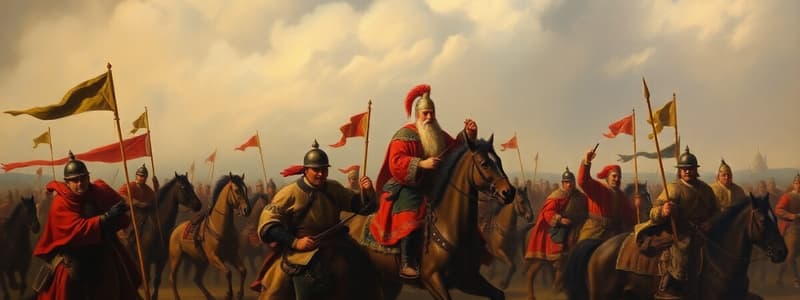Podcast
Questions and Answers
What factors contributed to the Mongols' success in conquering vast territories?
What factors contributed to the Mongols' success in conquering vast territories?
The Mongols' success was due to their superior military organization, advanced weaponry, strategic timing, and effective tactics like horsemanship.
How did the Pax Mongolica influence trade along the Silk Roads?
How did the Pax Mongolica influence trade along the Silk Roads?
The Pax Mongolica established peace and stability that facilitated increased safety, improved infrastructure, and better communication for trade.
What role did Kublai Khan play in the integration of Mongol and Chinese cultures?
What role did Kublai Khan play in the integration of Mongol and Chinese cultures?
Kublai Khan established the Yuan Dynasty in China and embraced Confucianism, adopting local cultural norms.
In what ways did the Mongol Empire contribute to cultural and technological exchange?
In what ways did the Mongol Empire contribute to cultural and technological exchange?
Explain the significance of the Uyghur script in the context of the Mongol Empire.
Explain the significance of the Uyghur script in the context of the Mongol Empire.
Flashcards are hidden until you start studying
Study Notes
The Mongols: A History
- The Mongol Empire was the largest contiguous land-based empire in history.
- Genghis Khan (Chinggis Khan) was a Mongol leader who united the Mongols in 1206 and went on to conquer a vast territory, including northern China, Central Asia, and Southern Russia.
- The Mongols were successful in conquering other empires due to superior military organization, weaponry, and skill, as well as a strategic timing.
- Mongol tactics included the use of larger bows, skillful horsemanship, and a reputation for brutality that often resulted in the surrender of enemy forces out of fear.
- The Pax Mongolica was a period of relative peace and stability under Mongol rule.
- Following the death of Genghis Khan, his grandsons divided the empire into several khanates, each with significant autonomy.
- Mongol rulers often adopted the cultural norms of the people they ruled, such as Kublai Khan's establishment of the Yuan Dynasty in China and his embrace of Confucianism.
- Trade flourished along the Silk Roads during the Pax Mongolica, with increased safety, infrastructure improvements, and communication facilitated by the Mongols.
- ** Mongol rulers encouraged the transfer of technology and ideas by sponsoring intellectual and artistic endeavors, leading to the exchange of medical knowledge, language, and cultural traditions across Eurasia.**
- The Mongols' use of the Uyghur script for their language helped spread literacy and further integrated conquered territories into the empire while establishing a written language.
- Despite their brutal conquests, the Mongol Empire was ultimately responsible for significant cultural and technological exchange across Eurasia.
- The decline of the Mongol Empire paved the way for the rise of centralized states and cultural movements that shaped the modern world.
The Mongol Empire
- The Mongol Empire was the largest contiguous land-based empire in history.
- Genghis Khan united the Mongol tribes in 1206.
- Under Genghis Khan, the Mongol Empire expanded rapidly, conquering parts of Northern China, Central Asia, and Southern Russia.
- The Mongols' successful military strategies included using larger bows, skilled horsemanship, and a reputation for brutality.
- The Pax Mongolica, a period of relative peace and stability, existed under Mongol rule.
- After Genghis Khan's death, his grandsons divided the empire into several khanates, each with autonomy.
- Mongol rulers often adopted the cultural norms of the people they ruled.
- Kublai Khan established the Yuan Dynasty in China and embraced Confucianism.
- The Silk Roads flourished under the Pax Mongolica due to increased safety, infrastructural improvements, and better communication facilitated by the Mongols.
- Mongol rulers promoted cultural exchange across Eurasia by sponsoring intellectual and artistic endeavors.
- The Mongols adopted the Uyghur script, which aided in the spread of literacy and further integrated conquered territories.
- The Mongols facilitated the transfer of knowledge, ideas, and cultural traditions across Eurasia during their reign.
- The decline of the Mongol Empire eventually gave way to the rise of centralized states and cultural movements that shaped the modern world.
Studying That Suits You
Use AI to generate personalized quizzes and flashcards to suit your learning preferences.



